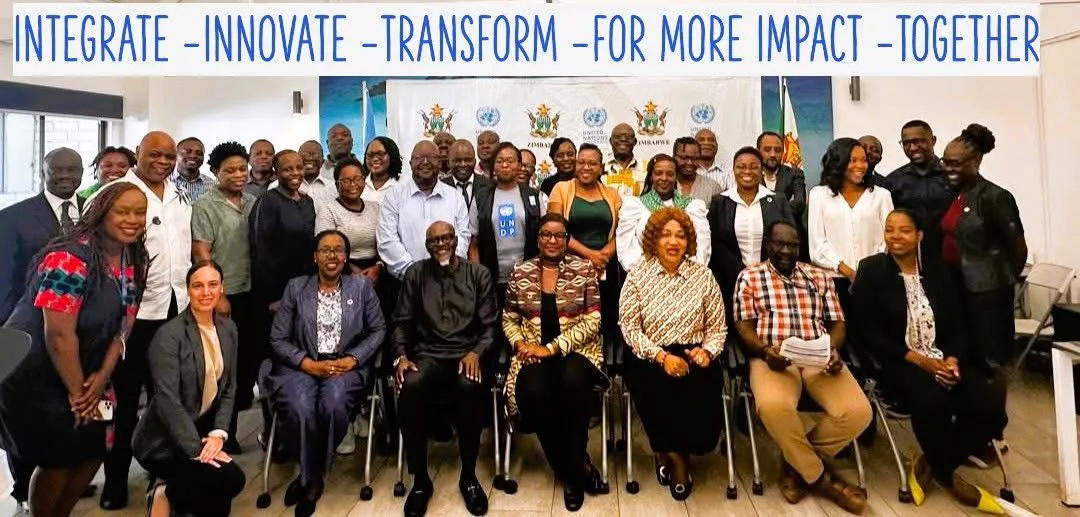|
Getting your Trinity Audio player ready...
|
Writes Sirak Gebrehiwot
10 April 2025, Harare – The United Nations Operations Management Team (OMT) held a strategic planning meeting under the theme “Integrated, Innovate, and Transform for Impact Together” in Harare from 8 to 9 April 2025.
The meeting marked an essential assessment of the progress made towards realizing efficiency results, documenting valuable lessons learned, and identifying priorities for 2025. With the participation of over 30 experts from various UN entities in Zimbabwe, the meeting deliberated on reinforcing the UN’s commitment to operational excellence and sustainable development outcomes.
Ms. Fatou Lo, Acting UN Resident and Humanitarian Coordinator for Zimbabwe, emphasized the significance of optimizing resources to enhance the effectiveness of the UN development system.
Officially opening the planning meeting, she said, “In line with the UN Secretary-General’s 2017 vision to enhance the UN development system’s effectiveness and alignment with the 2030 Agenda, the reform introduced an “efficiency agenda” focused on optimizing resources, improving performance, and reinvesting cost savings into development outcomes.”
The strategic meeting served not only as a platform for reflecting on past achievements but also set the ground for future priorities. Ms. Lo acknowledged the collective efforts of the OMT in implementing the Business Operations Strategy (BOS) and achieving a remarkable USD 6.7 million in cost avoidance by 2024, inching closer to a target of USD 6.79 million by 2026. She said, “As a team, you have worked tirelessly in implementing the Business Operations Strategy for Zimbabwe in 2024 despite tremendous challenges,” thus recognizing their commitment and resilience.
Ms. Miranda Tabifor, Chair of the UN Programme Management Team (PMT) in Zimbabwe, also underscored the need for enhanced collaboration between inter-agency working groups on the Zimbabwe United Nations Sustainable Development Cooperation Framework (UNSDCF). In her remarks, she highlighted the importance of synergy amid a changing landscape for Official Development Assistance (ODA), urging that, “the ongoing dynamic of the ODA landscape demands innovation and transitioning from funding models to finance for development.” This sentiment echoes the urgent need for UN entities to pivot operations and embrace new modalities to ensure impactful service delivery, particularly for vulnerable populations.
Both Ms. Lo and Ms. Tabifor indicated that the restrictive funding environment and cuts in assistance underscore the necessity for the UN and its partners to adopt innovative operational strategies. “This necessitates a profound change in the ways of working,” Lo remarked, stressing the need for leveraging technology and generating cost-effective solutions to maximize the impact on communities served.
The key objectives of the retreat included evaluating the quality and cost-effectiveness of business operations, setting priorities for 2025, and documenting lessons from the successful implementation of the common services initiative. By enhancing collaboration among inter-agency teams, the OMT is determined to create a cohesive strategy toward achieving the efficiency agenda.
As the UNCT in Zimbabwe works towards realizing the Secretary General’s projected savings of USD 310 million globally, the focus remains fixed on quality improvement alongside cost avoidance. The integration of 16 common services across various facets of UN operations is critical to achieving these goals, underscoring the pivotal role of initiatives such as the Common Back Office and Common Premises in bolstering efficiency.
The UN Operations Management Team’s strategic planning meeting in Harare signified a milestone in the UN’s journey towards operational excellence, particularly in the context of the UN efficiency agenda.
Chair of the Operations Management Team, Mr. Daouda Diop said, “The OMT is committed to optimizing resources, fostering collaboration, and embracing innovation remains critical for ensuring sustainable development outcomes in Zimbabwe.” This commitment reinforces the UN’s ongoing mission under UN 2.0 to respond effectively to the challenges of today, enabling a brighter future for the Member States and communities it serves.
The UN 2.0 builds on major structural reforms since 2017 and encapsulates the Secretary-General’s vision of a modern United Nations system, rejuvenated by a forward-thinking culture, and empowered by cutting-edge skills fit for the twenty-first century. Leveraging its diversity, the UN and its entities are striving towards a powerful fusion of data, innovation, digital, foresight, and behavioral science expertise – a dynamic combination dubbed “quintet of change”.
Grounded in a stronger organizational culture, UN 2.0 signifies transformation towards more agile, diverse, responsive, and impactful United Nations entities – to accelerate systemic shifts that deliver for all, including women and girls.
Sirak Gebrehiwot is UN Partnerships and Development Finance Advisor at the UN Resident Coordinator’s Office






